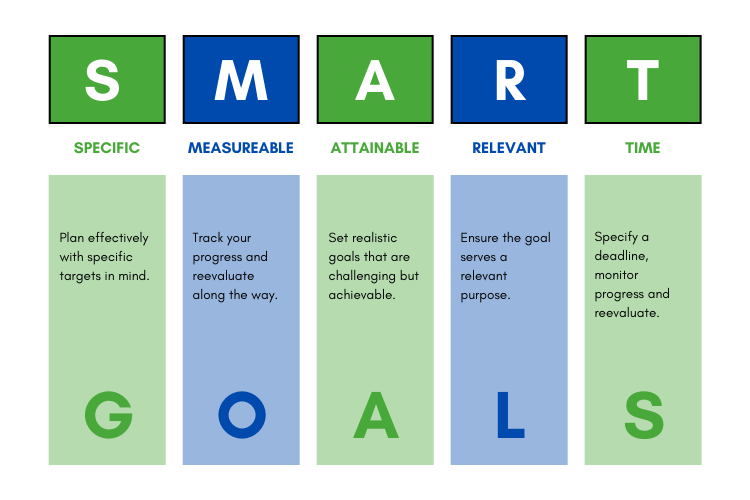Teachers Explain Goal Setting Strategies for Students

An online education platform is releasing an article about goal setting on the last day of January? It may seem like a strange move, but one Forbes article cites a study that found 80% of New Year's resolutions were abandoned by February. Experts believe that setting goals is far more effective than setting resolutions, and we agree. That's why we're declaring today, and every day, a chance to set and accomplish goals.
Why? Resolutions can be an overwhelming, but taking things day by day leads to success. To provide some goal setting strategies, we turned to our community of inspiring teachers for their best tips on setting and achieving goals.
Teachers Share Their Best Strategies for Goal Setting
Read on to hear the amazing advice shared from the inspiring community of Lessonface teachers.
Break Big Goals Down Into Smaller Ones
Bass teacher and professional musician Bear Williams shared, "I always tell my students that all of their musical goals are attainable, just as long as they develop a plan for success and go after each goal, one bite-size chunk at a time." Step by step is the name of the game!
Saxophone teacher Willem Moolenbeck echoes this sentiment, "Know what your goal is and find a teacher who can help you break it down into manageable, ordered chunks. Most music performance skills are built up over time as muscles and nerves are trained, in a coordinated manner, to achieve the desired results."
Piano, guitar, and Russian teacher Elijah Bogdanov shares "Find the next right small step. Find the right extent of your steps. If your plan seems to be perfect but things don't fly, maybe you missed a few small steps and you're trying to reach too far for now. Find the closest step."
Communicate Clearly With Your Teacher
Teachers can be your biggest supporters when it comes to setting and achieving goals, but it's important to communicate your goals with them, first! Classical composition, music theory, and clarinet teacher Kristi Boonzaaier emphasizes the importance of communication. "It's important to speak about the skill you want to develop with your tutor or educator. Ask if they can break your goals into small tasks that can help ease you into a routine of development. Furthermore, think about why you want to develop this skill. Intrinsic motivation can carry you far, and you'll go even further with a schedule to help keep you accountable."
Use the SMART Method

SMART is a simple acronym to help guide you through the goal setting process. Top Lessonface guitar teacher Leah Kruszewski goes into more detail about the SMART approach in this article.
Practice Daily for Shorter Periods of Time
Sometimes the daily habit of practicing can feel overwhelming. However, short periods of regular practice can be suprisingly effective in reinforcing new skills and techniques. Guitar teacher Emily Zimmer explains, "Practice more frequently, rather than for longer periods of time. For example, 30 minutes of practice 5 days per week is much more effective than 2 hours of practice 3 days per week. Less time between practice sessions = less time to forget what you just learned. If you forget it, you've got to spend more time re-learning it. Why waste time? Learn it, keep it fresh in your mind, and you'll make it permanent quickly."
Piano and voice teacher Arden Titus agrees with the plan of practicing in more frequent, but shorter sessions. "Set a practice regimen and stick to it. Practicing regularly for shorter periods of time is much more effective than cramming for hours before your lesson. Setting aside some time on your instrument that's just for fun can help keep your spark for music going in times when regular practice and deadlines feel demoralizing."
Study Music Theory
Understanding the art of music can make it easier to learn a new instrument or a new piece of music. Piano, guitar, music theory, audio recording, and music production teacher Matthew Smith is a big advocate for including music theory in your goal setting.
"I like to encourage students to keep a workbook, writing down their current metronome tempo, bar number, or any other notes for exercises and pieces of music they are currently working on. One of my favorite experiences has been helping a very well practiced pianist in their goal to understand the music they had spent so much time playing. We did this through some basic music theory study and analysis, which when combined with some development in ear training, actually quickened their learning process for new pieces of music. This also enabled them to begin experimenting with composition, a task which seemed daunting and mysterious before."
Master Your Technique
Flamenco guitar teacher Leopodo Delorenzi stresses the importance of technique.
"I'm a flamenco guitar teacher, but this is something that can applies to any musical instrument on any genre. When you start to study flamenco guitar, you have to bear in mind that you will have to study the correct technique because playing flamenco needs it, but all people can do it! The time you have to practice, regardless of whether you have 15 minutes or an hour, be sure to practice with the correct technique and the understanding that playing any instrument well is a mental and not a physical skill. Always remember: if you practice wrong, the result will be wrong no matter how long you practice. This way, I assure you, soon you will achieve goals that you thought were impossible and you will begin to have a great technique for your whole life."
Stay Organized and Take Notes
Some teachers find goal setting to be way more successful when you stay organized, keep a regular schedule, and take notes. Voice teacher Amanda Austin says, "Organization! I highly recommend keeping a log of your lessons in a journal and on recording device (you can video record on Lessonface too!)"
Voice, piano, and audition prep teacher Leah Hinton talks about the importance of an organized practice schedule, "Set a practice schedule and work to stay consistent with it each week. Even schedule what you will practice as far as warm-ups, exercises, songs, etc. Pick 1 or 2 specific things to grow in and focus on those things for a certain amount of consistent time." She goes on to talk about a student who succeeded with this method, "I am currently working with a student on vocal strengthening. I was able to help her see the complexities of the voice and how to work on projection in speaking and singing."





